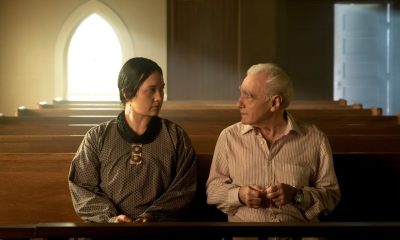Entertainment
‘The Fall of the House of Usher’ review: ‘Succession’ meets Edgar Allan Poe in brilliant horror series
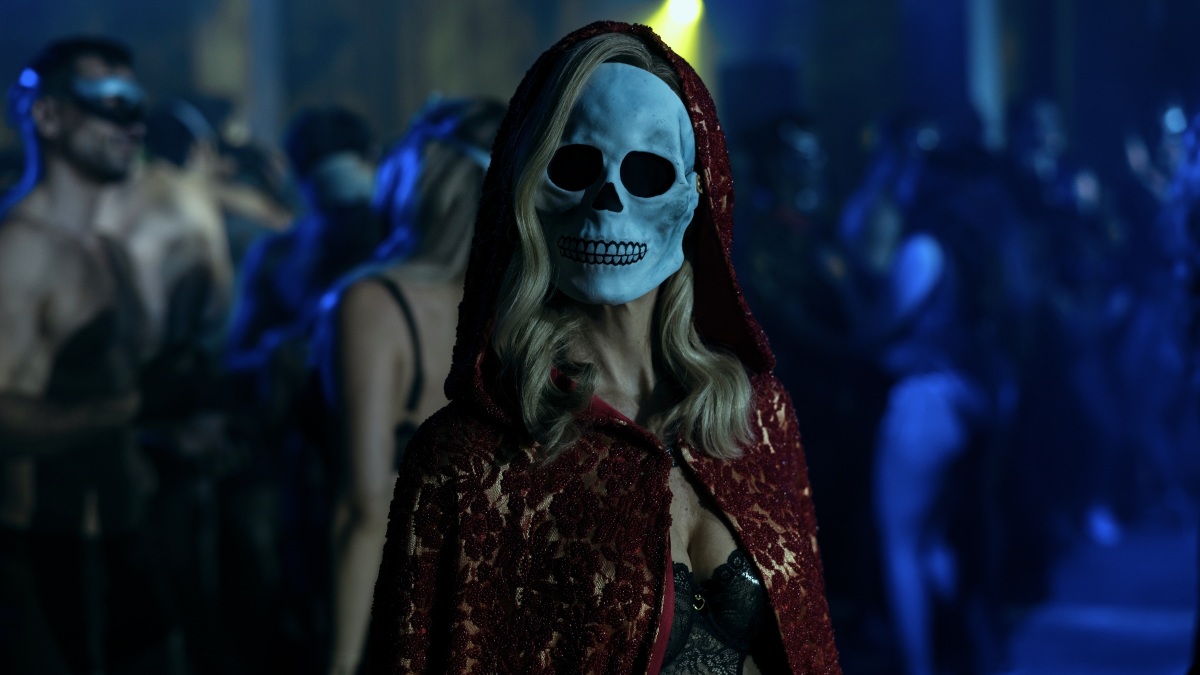
Even if you’ve never read the stories of Edgar Allan Poe, you’re likely familiar with elements of his work: A constant heartbeat, heard by only one man. A host of masked revelers, unaware that death walks among them. A deadly pendulum, swinging ever downward. And of course, a raven cawing, “Nevermore.”
These and many more staples of Poe’s gothic iconography weave their way through The Fall of the House of Usher. The new miniseries from Mike Flanagan takes its name from one Poe story, but is in actuality an adaptation of several of the author’s short stories and poems. Flanagan is certainly no stranger to bringing classic works of horror to the screen, adapting Shirley Jackson’s The Haunting of Hill House and Henry James’ The Turning of the Screw (adapted as The Haunting of Bly Manor). Yet the sheer volume and versatility of Poe’s stories makes The Fall of the House of Usher Flanagan’s most ambitious project yet — ambition that pays off in bloody, beautiful spades.
In classic Flanagan fashion, The Fall of the House of Usher is a scare-filled ride into the deepest pits of existential dread. Here, gore-slathered ghosts lurk hand-in-hand with questions of legacy and mortality. Poe-style horror interrogates the skewed systems of power placing our world in a chokehold. And at the center of it all is the devastating spectacle of a family eating itself alive.
What is The Fall of the House of Usher about?
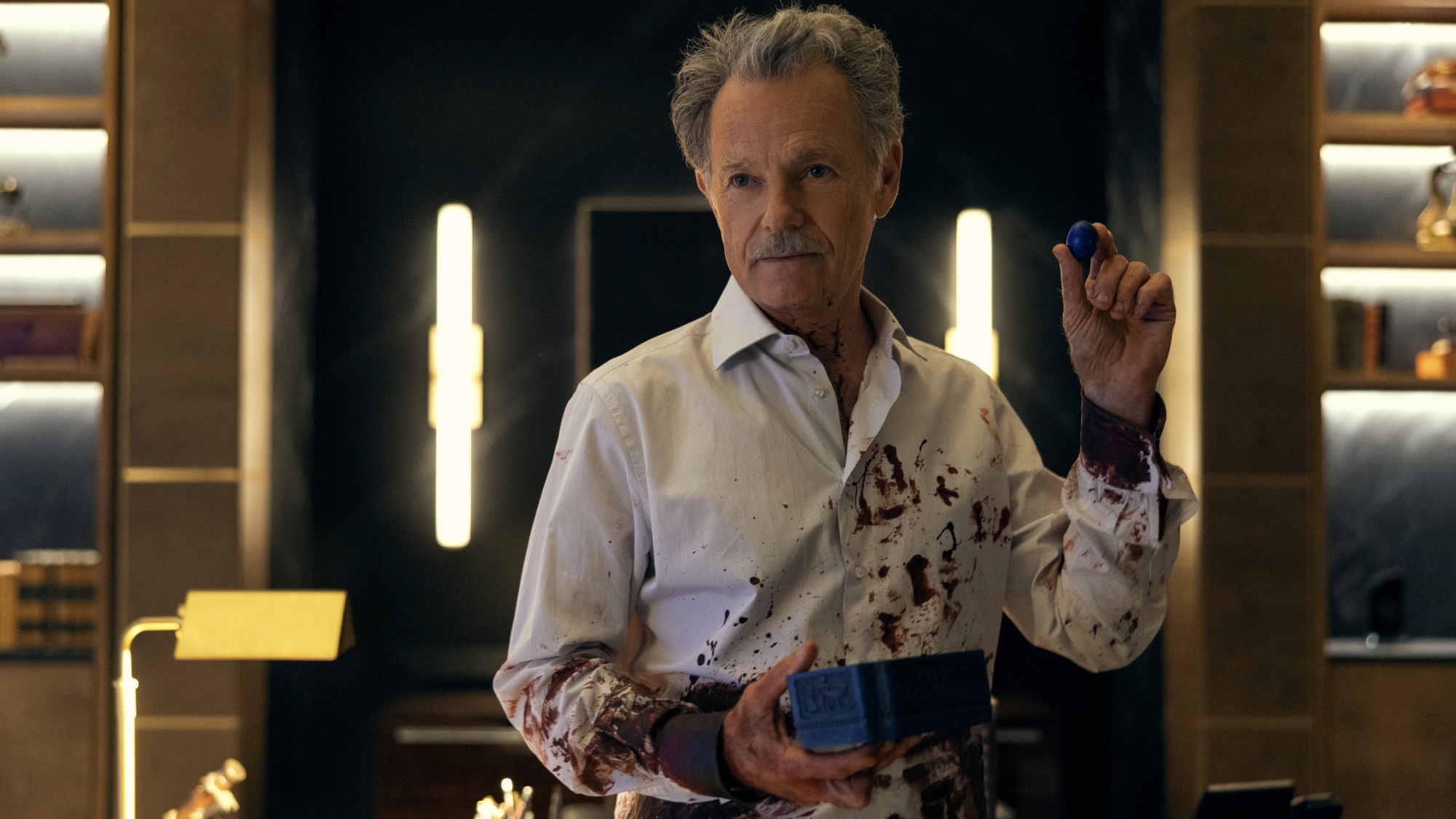
Bruce Greenwood in “The Fall of the House of Usher.”
Credit: Eike Schroter / Netflix
That family is the Usher family, headed up by siblings Roderick (Bruce Greenwood) and Madeline (Mary McDonnell). The two lead the medical company Fortunato Pharmaceuticals, which they have transformed into an empire of riches. Along for the ride are Roderick’s six children: Frederick (Henry Thomas), the eager heir apparent to Fortunato; Tamerlane (Samantha Sloyan), an aspiring Gwyneth Paltrow-esque lifestyle guru; Victorine (T’Nia Miller), a medical researcher with a penchant for bending the rules; Napoleon (Rahul Kohli), a drug-fueled game developer; Camille (Kate Siegel), a cutthroat media strategist; and Prospero (Sauriyan Sapkota), a party animal nicknamed “Gucci Caligula.”
By the time the show begins, all six children are dead.
With the utter annihilation of his family close at hand, Roderick calls Auguste Dupin (Carl Lumbly), an attorney prosecuting Fortunato, to his rotting childhood home. Lit by candlelight, unspeakably expensive glass of whiskey in hand, Roderick confesses to everything he and Madeline did to make Fortunato so successful — and how his actions led to the gruesome fates of his children.
The Fall of the House of Usher is an ingenious adaptation.
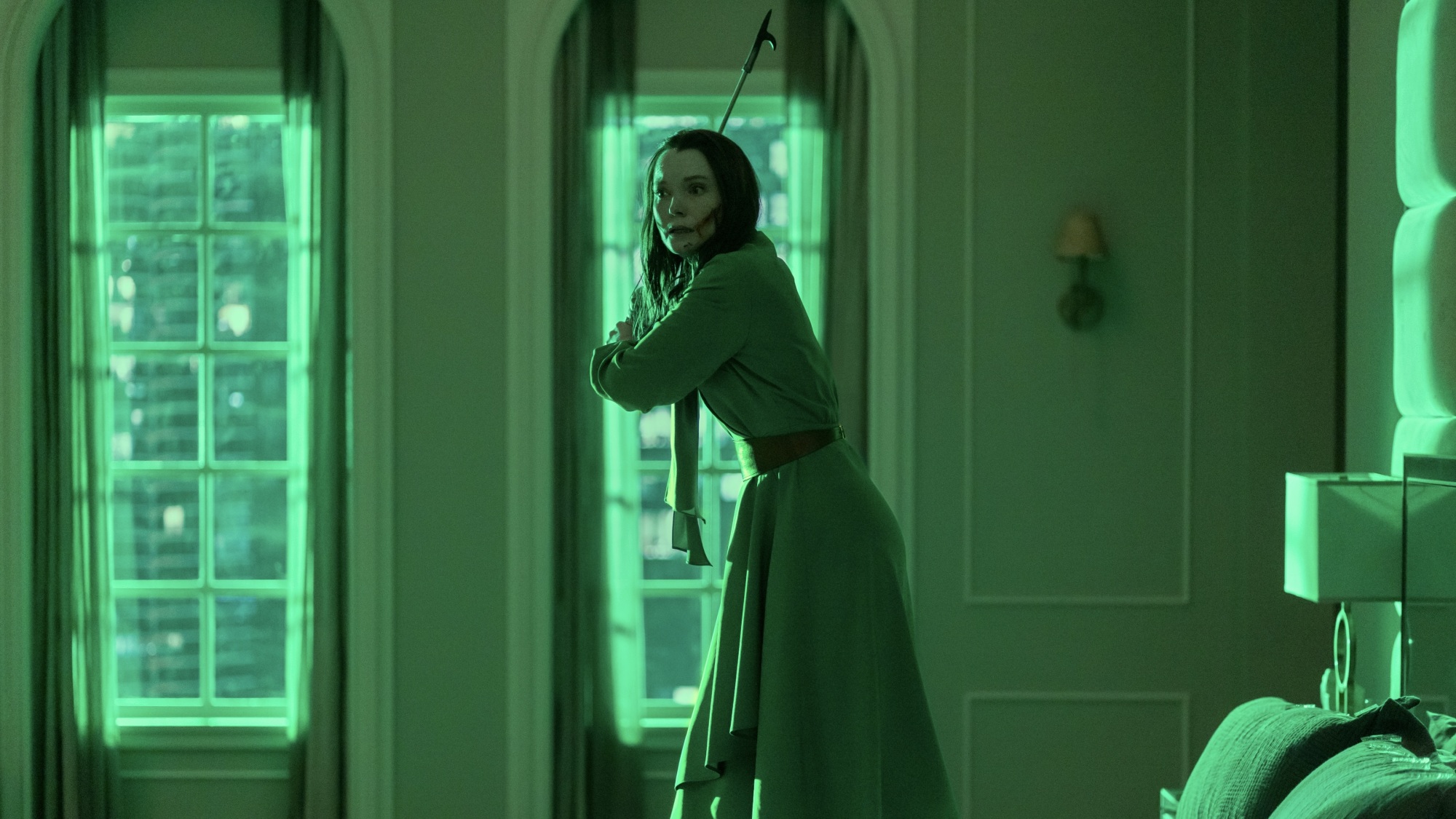
Samantha Sloyan in “The Fall of the House of Usher.”
Credit: Eike Schroter / Netflix
Notably, none of the six Usher children in the show feature in the original short story. However, their names and demises will no doubt be familiar to fans of Poe’s work, as Flanagan uses each of the deaths to echo famed short stories of Poe’s. Episode titles include “The Masque of the Red Death” and “The Tell-Tale Heart,” so you can probably guess which Usher will die — and how — at the start of each installment. The result feels like a mini Poe anthology, all bound together by the framing device of Roderick’s confession.
Adding to that anthological feel is the sheer difference between each Usher family member. Yes, the Ushers share unimaginable wealth and status, but they use those assets in varying ways. Prospero’s hedonistic partying is worlds apart from the sterile labs Victorine calls home; Tamerlane’s fears about a new brand launch clashes with Napoleon’s desire to play games and lose himself in drugs all day. With each episode, Flanagan builds a new world centered on the doomed Usher, only to bring it crashing down with a healthy dose of gothic horror.
‘The Fall of the House of Usher’ trailer teases family misfortune by way of Edgar Allan Poe
Yet no element of The Fall of the House of Usher is a one-to-one recreation of a Poe story. Nor is this show Flanagan’s attempt to jam as many Poe Easter eggs as possible into eight episodes. Instead, it is a dizzying mosaic of adaptation, one that surfaces the intertextuality of Poe’s work in an entirely new time period.
As with The Haunting of Hill House and The Haunting of Bly Manor, Flanagan brings The Fall of the House of Usher‘s source material into the present day. Poe’s preoccupation with death rings true even with the change in time period — especially as Roderick watches his children drop like flies — and universal vices like wrath and envy are still the cause of downfall to the Usher family. However, these vices take on a different shape in a modern setting, allowing Flanagan to examine 21st-century evils. Chief among these are the greed and dishonesty that led to the opioid epidemic, with pharmaceutical businesses profiting from and perpetuating a cycle of human pain. It’s all too easy to draw a line between the Ushers and the Sackler family.
The Fall of the House of Usher whips up scares from familial woes.
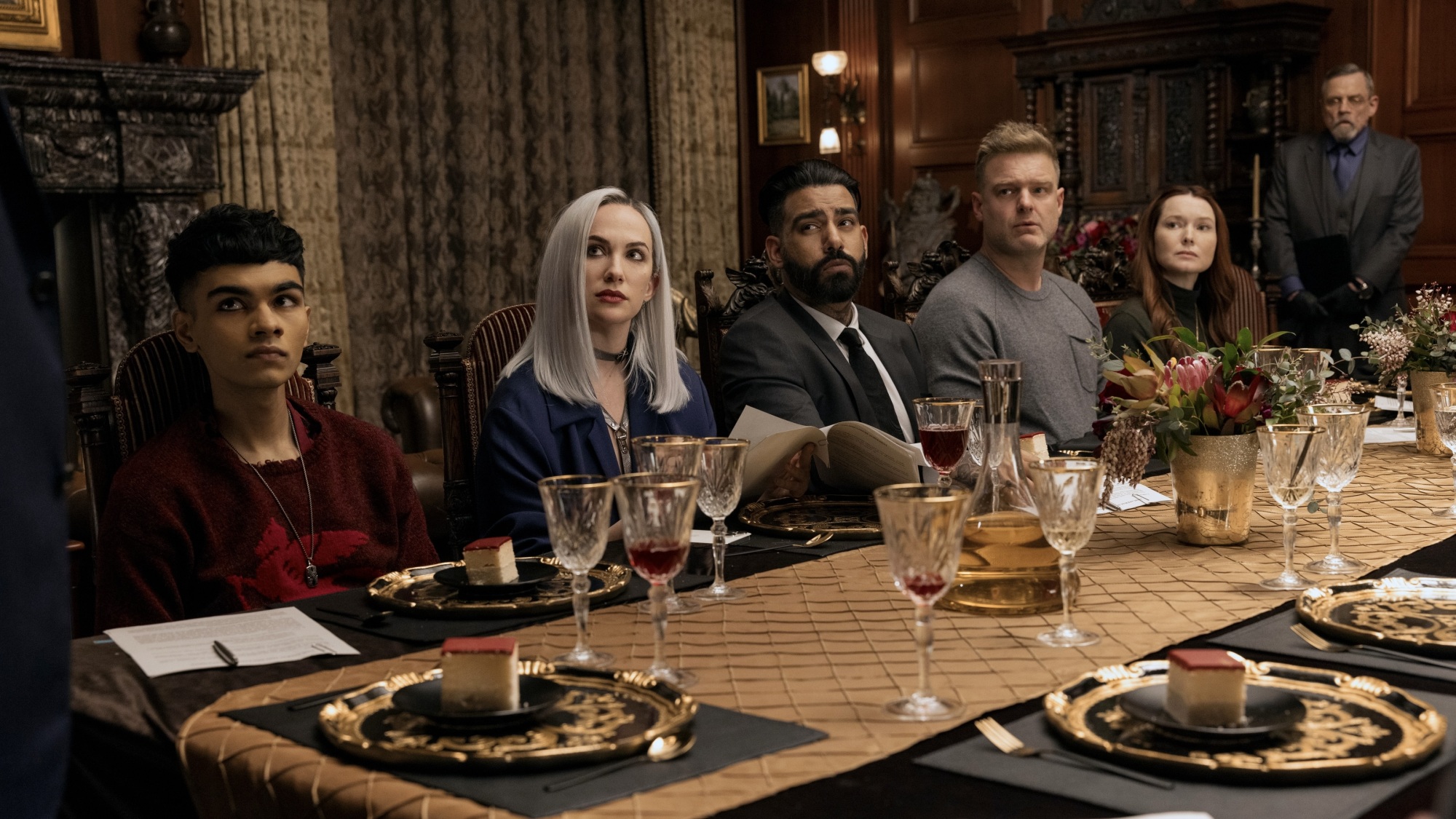
Sauriyan Sapkota, Kate Siegel, Rahul Kohli, Matt Biedel, Samantha Sloyan, and Mark Hamill in “The Fall of the House of Usher.”
Credit: Eike Schroter / Netflix
The Sacklers aren’t the only family the Ushers share figurative DNA with; comparisons with Succession‘s Roy clan are also ripe for the making. After all, the Roy siblings and the Usher children share a ruthless desire to keep their piece of their family’s massive fortune. They also desperately crave their father’s approval, especially since Roderick makes each of his children pitch him a venture in order to claim their birthright. However, while Succession focuses on the children of a formidable father warring over his legacy, The Fall of the House of Usher sees that patriarchal figure lose any chance of a legacy as his children die off. If anything, it’s Succession in reverse.
Still, that’s not where the Succession similarities end. Barbed insults and fast-paced discussions of “optics” abound, while the Newton Brothers’ piano and strings-heavy score calls to mind Nicholas Britell’s work on Succession. Both shows draw horror from highly dysfunctional family dynamics as well, including siblings forced into competition with each other and deep-seated issues with intimacy. But only The Fall of the House of Usher manifests said horror with blood and guts and ghosts.
The Fall of the House of Usher uses its scares to externalize characters’ deepest fears. Nowhere is this truer than with Roderick, who is plagued by visions of his children’s grisly corpses. They intrude upon his confession to Dupin in expertly-timed jump scares, but are they truly ghosts — or just hallucinations of a fading mind? Flanagan plays with the ambiguity of these spirits, a choice that renders Roderick’s plight even more tragic and adds an urgency to the tale he’s telling.
Besides the Poe source material, the one constant throughout every Usher death is the presence of the mysterious Verna (Carla Gugino). An enigmatic woman from Madeline and Roderick’s past, she stalks through soon-to-be crime scenes, warning the Ushers of their fates with one bone-chilling monologue after another. Gugino imbues this ever-shifting character with a glistening menace, along with a surprising tinge of fatigue at dealing with the Ushers. Time and again, she watches them succumb to their worst impulses — and with them, their most painful deaths.
Gugino’s mesmerizing otherworldliness as Verna makes a perfect foil for Greenwood’s Roderick, a weary man reckoning with the catastrophic fallout of his actions. While the worst of these actions remains a festering secret for most of the show, The Fall of the House of Usher slowly peels away the layers of Roderick and Madeline’s wrongdoings until you’re left with nothing but a sick sense of dread.
Death is inevitable as The Fall of the House of Usher leads us toward its brutal yet poetic conclusion. And even though we know what lies in store for the Ushers, the show’s careful pacing and riveting twists make the journey to those fates absolutely enthralling. Part brilliant adaptation, part horrifying family tale, The Fall of the House of Usher invites you to stare into the void of consequence alongside Roderick — and you simply cannot tear yourself away.
The Fall of the House of Usher was reviewed out of its world premiere at 2023’s Fantastic Fest. It hits Netflix Oct. 12.
-

 Business6 days ago
Business6 days agoIndia-Pakistan cricket match helps Disney’s Hotstar set global streaming record
-

 Business6 days ago
Business6 days agoThe SBF trial continues, Atlassian acquires Loom, and OpenAI explores making its own chips
-
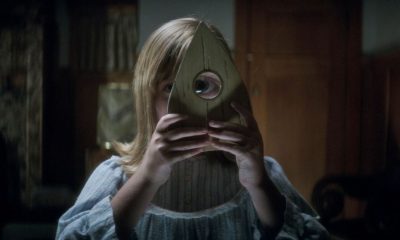
 Entertainment7 days ago
Entertainment7 days ago‘Ouija: Origin of Evil’ Easter egg spotted in Mike Flanagan’s ‘The Fall of the House of Usher’
-

 Entertainment6 days ago
Entertainment6 days agoChatting with Meta’s dystopian AI personas leaves more questions than answers
-

 Entertainment6 days ago
Entertainment6 days agoThese tiny ‘Fall of the House of Usher’ clues give away how each of the children die
-

 Entertainment6 days ago
Entertainment6 days ago‘The Fall of the House of Usher’: The most WTF moments
-

 Business6 days ago
Business6 days agoBlue checks aren’t protecting sex workers from X’s porn crackdown
-

 Business7 days ago
Business7 days agoTikTok scores sizable Disney deal including a content hub and publisher partnership

